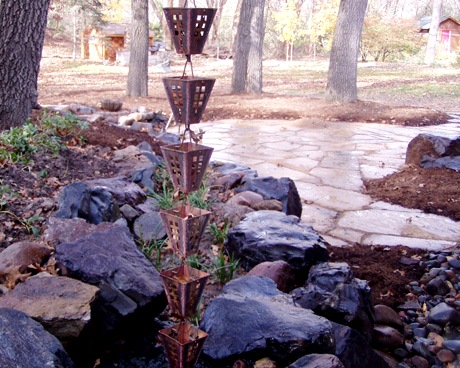Is A Rain Chain Right for Your Home?

Rains have finally come to Northern California, leading to widespread jubilation among residents who were starting to worry about drought, but along with rain comes a perennial winter issue: managing gutters and downspouts. For households who didn't plan ahead, clogs, misaligned downspouts, and other problems are making themselves apparent, requiring hasty fixes to get ahead of the weather before water ends up where it shouldn't.
Other homeowners are cozy inside by the toasty fire listening to the sound of the rain on their snug San Francisco roofs. Some are enjoying a little something extra: the unique sound of rain rushing down the rain chains they've used to replace their downspouts.
Types of Rain Chains
Used in Japan for centuries, rain chains have started to catch on in the United States as an attractive and fun downspout alternative. Some feature actual chains, while others may use different shapes like cups or bells which ring as the rain travels down them and into a graveled catchment, there to drain into an appropriate area of the yard. Rain chains add a lot of curb appeal to the house and sound lovely, but if you're considering installing one, make sure you know what you're doing.
Beware an Incorrectly Installed Rain Chain
As with any downspout, an improperly installed rain chain can lead to problems. Poor drainage can lead to pooling water around the foundation of the house, which contributes to high humidity, mold, and mildew. Too much water can even start to crack and damage the foundation directly, in addition to promoting the high moisture levels insects tend to like. Meanwhile, bad drainage in the yard can create soggy, muddy spots, and if water is misdirected, it may upset a neighbor by flooding her property.
Rain Chains vs Downspouts
Here are some disadvantages of rain chains: they're less sturdy, and less high-capacity, than traditional downspouts. If you live somewhere with heavy weather and high winds, you'll need to install backup downspouts to handle your rainfall because rain chains alone won't be able to do the job. You also need an effective collection system, which might be a water feature like a temporary water garden, a barrel, or a French drain that routes the water to another location. It's critical to divert water away from the house to prevent damage.
Advantages of Rain Chains
The obvious advantage, of course, is that rain chains are much more attractive than most downspouts. They come in a variety of styles and finishes, including copper, which can develop a patina over time to create a beautifully weathered look. Some also produce beautiful musical sounds, which can be a pleasant counterpoint to the rain.
DIY Rain Chains
DIY rain chain projects are another option, offering even more flexibility. For example, this project uses a chain paired with terracotta pots, and a large catchment of terracotta filled with small stones. In the dry season, the rain chain adds visual interest, and when it rains, it creates a beautiful cascading water feature.
Install a Rain Chain
Installing rain chains is quite easy, although if you're not comfortable working on your roof, you may want to hire a handyman for help. As long as you're up around the gutters, it's a good time to inspect them, clear debris, and replace any broken or damaged sections. Consider anchoring the chain to keep it in place if you're worried about high winds, and remember to inspect it regularly along with your gutters for signs of issues that might interfere with its efficiency.
Use Rain Chains Effectively
If you live in a high wind area, you may not be able to use rain chains. Your home also needs to have an overhang of at least three feet to allow rain chains to work most effectively, and remember that you will need a drainage system below the chain, whether it's a buried drain, a French drain, a water feature, or a large barrel for rainwater reclamation. With these considerations in mind, you can investigate your rain chain options, and find the one that's right for you.
Katie Marks writes for Networx.com.
Updated December 17, 2017.
Looking for a Pro? Call us (866) 441-6648

Roofing Average Costs
Roofers Experiences

Partial Siding Replacement To Get Rid Of Dry Rot

Roof Repair That Keeps The Snow Out Of Our Attic



